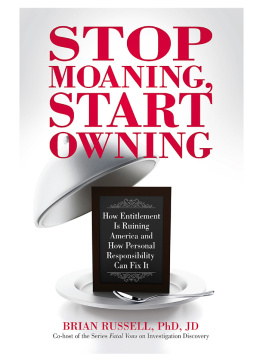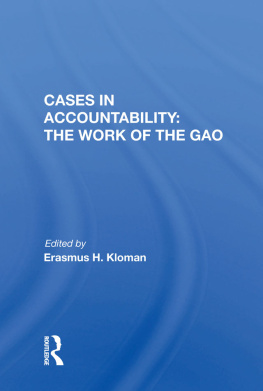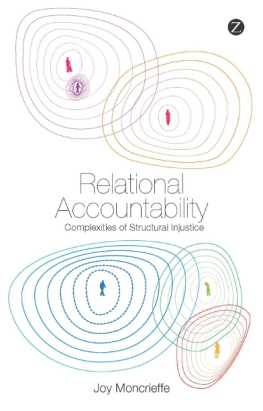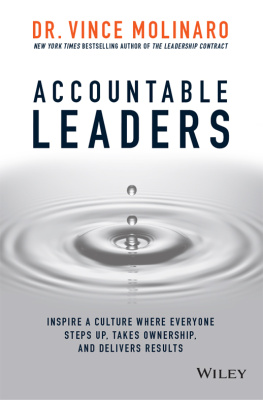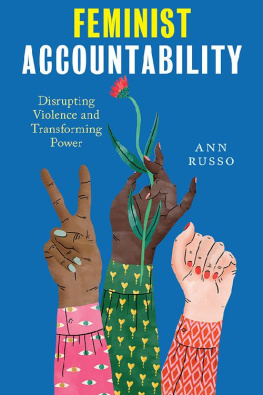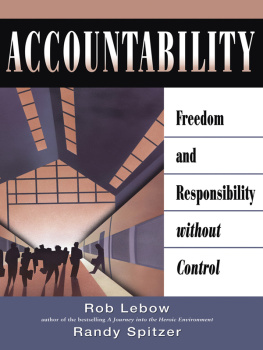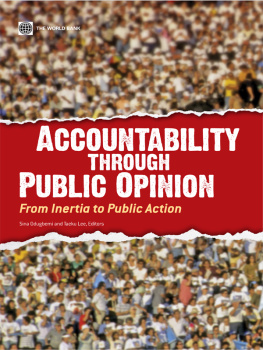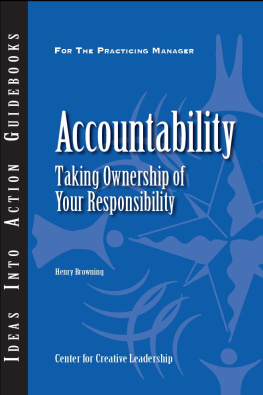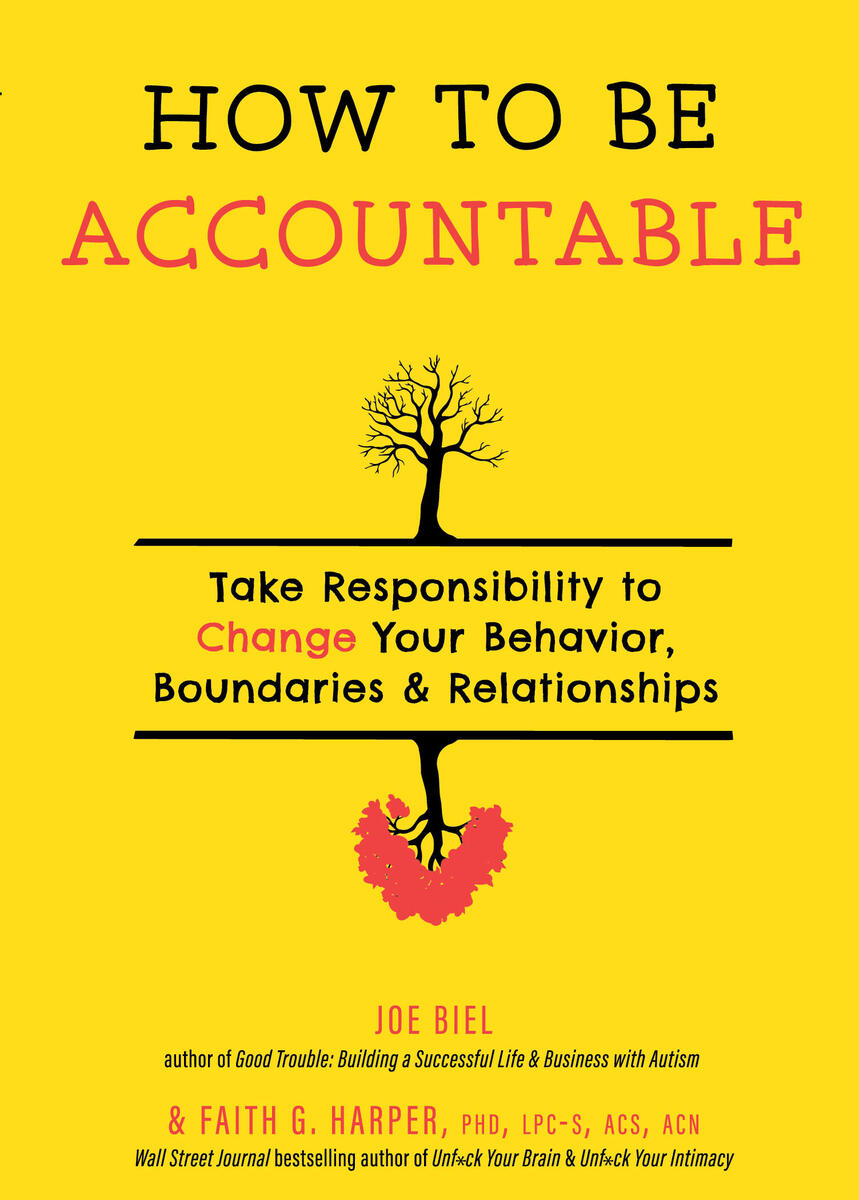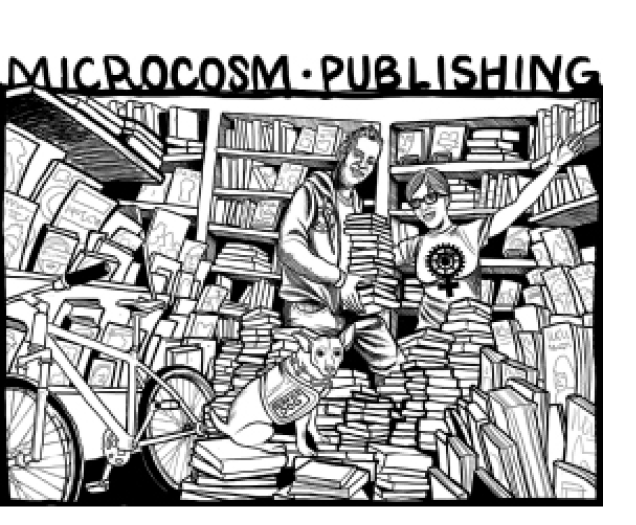How to be accountable take responsibility to change your behavior, boundaries & relationships
2020 Joe Biel and Faith G Harper
This edition Microcosm Publishing 2020
First edition - 5,000 copies - 11/11/2020
ISBN 9781621062363
eBook ISBN 9781621064428
This is Microcosm #472
Cover and illustration by Lindsey Cleworth
Edited by Sarah Koch
For a catalog, write or visit:
Microcosm Publishing
2752 N Williams Ave.
Portland, OR 97227
www.Microcosm.Pub
Numerous contributions were made by a broad community through openly sharing their stories and experiences for this book. We are eternally grateful to the wisdom and genorosity of those who have thought long and hard, while working intensively on these issues that affect literally every living person.
This book is dedicated to Rubine Red, Joes service dog, who passed away after eight years of working, during the final stages of writing this book.
Microcosm Publishing is Portlands most diversified publishing house and distributor with a focus on the colorful, authentic, and empowering. Our books and zines have put your power in your hands since 1996, equipping readers to make positive changes in their lives and in the world around them. Microcosm emphasizes skill-building, showing hidden histories, and fostering creativity through challenging conventional publishing wisdom with books and bookettes about DIY skills, food, bicycling, gender, self-care, and social justice. What was once a distro and record label was started by Joe Biel in his bedroom and has become among the oldest independent publishing houses in Portland, OR. We are a politically moderate, centrist publisher in a world that has inched to the right for the past 80 years.
Contents
Introduction
WHAT IS ACCOUNTABILITY AND WHAT DOES IT LOOK LIKE?
WHAT ACCOUNTABILITY is not
Accountability Vs. Punishment
Lucas Story
WHAT cAuses unwanted behavior
Why Is Accountability So Difficult
Heuristics and Biases
Classic CBT Coming in Hot And Spicy
Threat Assessments and Trauma Responses
Relational Influences
Susceptibility to Propaganda
In Conclusion
HOW TO CHANGE YOUR BEHAVIOR
Working with Our Reactions in the Immediate
Training Ourselves to Think
Maybe Shes Born with It, Maybe Its Bullshit Propaganda
UNPACKING OUR OWN HISTORY
Unfucking Our Mental Health Paradigm: Power Threat Meaning (PTM)
Unpacking Your Past
Unpacking Now
List of Potential Traumas
WORKING WITH THE SHADOW
Shadow Work Questions for Introspection
Shadow Work Meditation
CREATING AN ACTION PLAN
Accountability Goal Setting
The Accountability WOOP
Therapy, Coaching, Mentoring, and Accountability Partnerships
ATONEMENT, FORGIVENESS, AND REPENTANCE: ACCOUNTABILITY IN ACTION
The Failed Apology
A Better Way
Now Its Our Turn: The Three Rs of an Apology
I Cant Seem to Forgive MYSELF, Though
HANDLING CONFLICT
Conflict is Not Abuse
Conflict Affects Everyone
Four Levels of Communication
Communicating with I Statements
Talking Conflict Out in 6 Easy-ish Steps
BIFF Statements
Talking Out Conflict
The Opposite of Cancel Culture: Inviting In Versus Calling Out
Community accountability
Resolution
FUture (Accountable) You
Conclusion
References
About the authors
Introduction
A ccountability is the ownership of your choices and behaviors and the impact they have on the world, regard less of your intent. Accountability is aligning your patterns of behavior to your values.
When it comes down to it, people dont resist change. We resist being changed. Accountability cannot be bestowed upon us by someone else, no matter how well meaning they are or how much we love them. We have to be worn down enough by the toxic patterns in our lives to decide we want to do something about it.
Maybe your accountability is something individual. Youve cheated on a partner or assaulted someone. Perhaps you want to stop feeling like a burden on your roommates. Or you want to stop smoking. Maybe youre always missing deadlines at work or dont like to have serious conversations about your relationship with your partner. Maybe every time someone argues with you on the Internet you threaten to kill their dog. Maybe you want to create a daily exercise routine or live a life of purpose and meaning. Maybe youre an angry drunk who yells at your friends.
Or maybe its more systemic than your direct interpersonal relationships. Perhaps youre coming to grips with something large and systemic like the racism, homophobia, transphobia, and prejudice that has been fed to so many of us in modern society and you want to address them so you can be a proactive ally.
No judgement of your issue or issues; youre not alone in having made decisions you regret. All that matters is that you want to change something and youre here.
So lets face why youre here. Most people arent ready to be accountable until theyve either hit rock bottom or alienated someone from their life that they deeply care about. Maybe your partner gave you an ultimatum or you realized that your drinking is keeping you from the things that you care about or maybe your community is coming after you with pitchforks. Its scary. Its real. Youve successfully avoided responsibility up until now by promising to do better and/or making temporary changes. But now you have to put your money where your mouth is. One thing thats important to realize is that it may be too late to heal those particular relationships. So do this work for yourself, not for other people or for specific relationships.
Weirdly, the thing that very few books on the subject will tell you is that most human relationship behavior is just maladaptive stuff from your earlier life experiences. You didnt know how to get your needs met, so you figured out some clunky workarounds that, in adulthood, cause worse and worse damage each time you attempt them. Basically something went haywire at some point and you created coping behaviors that dont actually fulfill your relational needs in the long term. Needs like authentic, mutual, and healthy connections.
Everyoneincluding ourselveshas done things that they arent proud of. Well have confession time periodically throughout this book about our own fuckery. Throughout the text, when you see I, its Joe talking. When Faith is talking, well simply use her name.
I grew up as an undiagnosed autistic person, fumbling through the world in the dark with a light switch nowhere in sight. I wasnt given much in the way of moral guidance as a child and I developed a lot of coping mechanisms that were not effective at fulfilling my own needs, nor particularly kind to the people around me.
These coping skills got me through at the time, but didnt serve to support healthy relationships as I got older. So I needed to build new habits, instead of relying on old ways of being.
I was raised by my mom because my dad was confined to a wheelchair with his speech unrecognizably slurred. Our home was ruled by violence and confusion. Faith would refer to this as an avoidant-fearful attachment style if we are going to use clinical language. I witnessed my mother overtly lie to me about both benign and important things alike while also keeping secrets that deeply affected me. I internalized the idea that you dont have to open up about even the most important things. As I grew up, I watched other kids form friendships and develop emotional bonds while I noticed them increasingly avoid me. I eventually came to the realization that hiding intimate details of my life led people to distrust me. Coupled with my own maladaptive behavior, as an autistic person, my brains mirror neurons are incapable of detecting when someone is attempting to subtly or nonverbally communicate a boundary. People around me would perceive me as inflexible and disrespectful of their boundaries even after they had expressed them. I found myself alone.



